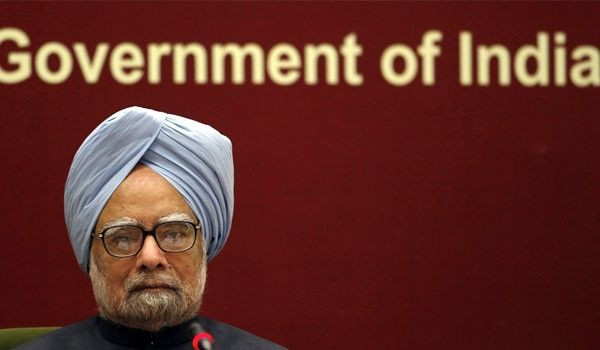Indian PM not guilty of inaction in 2G scam, Atty. Gen. tells apex court

Indian Prime Minister Manmohan Singh is not guilty of inaction but was misguided by the Law Ministry and the bureaucrats and hence delayed in filing replies to the complaints of an opposition lawmaker who sought sanction to prosecute 2G spectrum scam accused Andimuthu Raja, the Attorney General of India has submitted before the Supreme Court.
On Nov. 23, the Attorney General of India G. E. Vahanvati successfully convinced a 2-judge bench of the apex court that the prime minister had adequately dealt with the complaints of Janata Party president Subramaniam Swamy, who had sought sanction to prosecute Raja in the 2G spectrum scam case since 2008 and claims his complaints have been ignored till now by the prime minister.
Nonetheless, the telecoms scam, which has rocked India, is set to become a blot on Singh's reputation as the country's most honest politician even as the opposition lawmakers saw it as an opportunity to criticize the Congress party-led government.
The 2G spectrum scam, which could potentially emerge as one of the country's biggest corruption scams, has led to the sacking of Telecoms Minister Andimuthu Raja and the issue has been brought up continuously by opposition lawmakers in the parliament's winter session, which opened earlier this month.
Opposition lawmakers, who have continuously disrupted parliamentary proceedings, are demanding a full investigation into why a petition filed by Swamy seeking sanction to prosecute Raja in the 2G spectrum scam case in 2008 has been ignored till now by the prime minister.
Swamy has accused Raja over selling telecoms licenses too cheaply. Earlier this month, the Comptroller and Auditor General of India, an official watchdog, in its report into the telecoms licenses sale, also had accused Raja of a series of corrupt practices and suggested that the cheap sale of 2G spectrum licenses made the state potentially lose up to $31 billion in revenues. The sales process also violated several rules, the report said, as Raja had granted licenses to several telecom operators who were not qualified for the bidding process.
Raja, a member of the DMK, a regional party from Tamil Nadu that helps give the Congress party a majority in parliament, has denied the accusations.
The opposition lawmakers claim Singh is shielding Raja as he fears upsetting his coalition partner. Any investigation, and possible prosecution, into a minister must be approved by the prime minister.
The Supreme Court too, in a rare step, had publicly criticized Singh for his alleged inaction and taking such a long time to decide if Raja should be charged and investigated. On Nov 16, the court had directed the prime minister to file an affidavit explaining his alleged inaction.
On Nov. 20, Vahanvati filed a 10-page affidavit on behalf of Prime Minister detailing how Swamy's complaints were adequately dealt with by the Prime Minister's Office (PMO).
The attorney general also told the court on Nov. 23 that Singh was innocent and was not obliged to grant any sanction to Swamy because the latter did not file the complaint in the right forum.
Till date, the petitioner (Swamy) has not even filed a complaint in the competent court and in such circumstances, the question of sanction cannot and does not arise, Vahanvati submitted.
Sanction is to be granted only when a court takes cognizance of an offence and wants to initiate proceedings against an accused.
The petitioner could have filed a complaint. There's no provision in law for seeking sanction for filing a complaint.
The PM never had any mala fide intent. He never deliberately delayed filing a reply. He doesn't know law. He should've been advised correctly. It's his bureaucrats and the Law Ministry who are to blame, Vahanvati said.
The court agreed that Singh was not obliged to sanction any permission to Swamy under the stated circumstances.
Earlier, in response to the prime minister's affidavit, Swamy said his real target was the law ministry and the bureaucrats for wrongly advising the prime minister to wait for evidence before deciding on sanction to prosecute Raja.
There was no mala fide on the part of the prime minister. The prime minister was badly advised by law officers, the Law Ministry and bureaucrats, Swamy said in his affidavit filed Nov. 22.
It is regrettable that law officers of the government had failed to apprise the prime minister of the law of the land that he must decide on the sanction question only on the material provided by me.
The prime minister is an economist, he doesn't know the law and should be given the benefit of the doubt. After all, he needed advice from the concerned departments, Swamy said.
Meanwhile, Singh has also broken his silence and said that several investigating agencies were looking into the telecoms scam issue and the guilty will not go unpunished.
There should be no doubts in anybody's mind that if any wrong thing has been done by anybody, he or she will be brought to book, the prime minister said in a leadership summit held in Delhi on Nov. 20.
Singh also said he has nothing to hide and the government is ready to discuss all issues in parliament.
We are not afraid of discussion in parliament, the prime minister said, adding that the opposition lawmakers should not stall parliamentary proceedings.
© Copyright IBTimes 2024. All rights reserved.





















